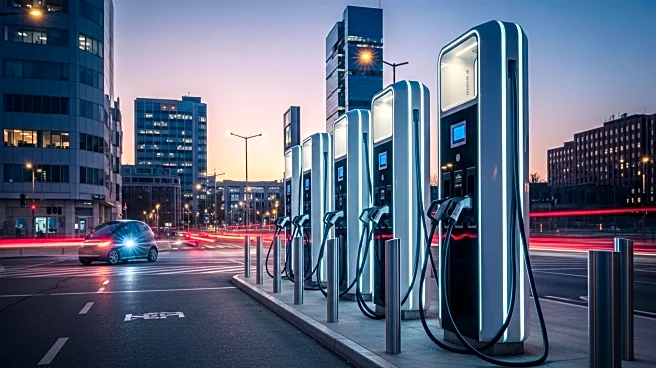What is the story about?
What's Happening?
TechCrunch Mobility has reported on significant developments in the transportation sector, focusing on the challenges faced by electric vehicle (EV) owners and the expansion of Waymo's robotaxi fleet. As the federal tax credit for EVs is set to expire, there is concern about a potential decline in EV sales in the U.S. Automakers are transitioning to Tesla's North American Charging Standard, which has led to the proliferation of charging adapters, complicating the charging process for EV owners. Meanwhile, Waymo has expanded its robotaxi fleet to over 2,000 vehicles, with significant operations in cities like San Francisco, Los Angeles, and Phoenix. This expansion highlights the growing presence of autonomous vehicles in urban areas.
Why It's Important?
The expiration of the federal tax credit for EVs could significantly impact the U.S. automotive market, potentially slowing the adoption of electric vehicles. This situation underscores the importance of government incentives in promoting sustainable transportation. The transition to Tesla's charging standard and the resulting need for multiple adapters could deter potential EV buyers due to increased complexity. On the other hand, Waymo's expansion of its robotaxi fleet represents a major step forward in the deployment of autonomous vehicles, which could revolutionize urban transportation by reducing traffic congestion and emissions. These developments have broad implications for the automotive industry, urban planning, and environmental policy.
What's Next?
As the EV market adapts to the loss of federal tax incentives, automakers may explore alternative strategies to maintain sales, such as price adjustments or new model launches. The industry will also need to address the challenges posed by the transition to a new charging standard to ensure consumer convenience. For Waymo, the continued expansion of its robotaxi fleet will likely involve navigating regulatory hurdles and public acceptance of autonomous vehicles. The success of these initiatives could influence future transportation policies and the pace of technological adoption in the sector.
Beyond the Headlines
The shift in charging standards and the expansion of autonomous vehicle fleets raise important questions about infrastructure development and regulatory frameworks. Ensuring a seamless transition for EV owners and addressing public concerns about safety and privacy in autonomous vehicles will be crucial. These developments also highlight the need for collaboration between automakers, technology companies, and government agencies to create a cohesive and sustainable transportation ecosystem.














